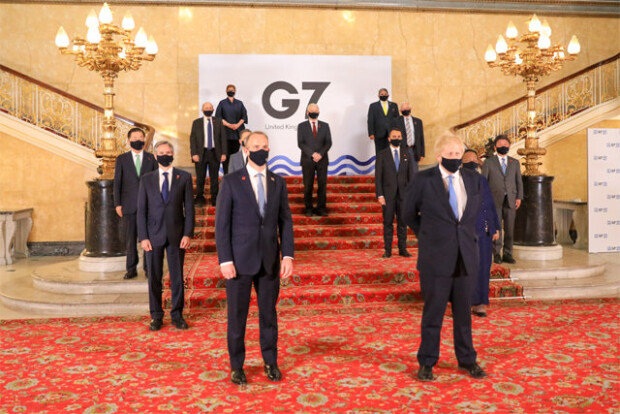G7 ministers endorse Biden’s North Korea policy
G7 ministers endorse Biden’s North Korea policy
Posted May. 07, 2021 07:28,
Updated May. 07, 2021 07:28

Foreign ministers of the G7 nations vowed Wednesday to endorse the Joe Biden administration’s new policy towards North Korea. It signaled the international community’s commitment to stand behind the United States to pressure Pyongyang to come back to the negotiation table. As for the agenda of China, even Taiwan Strait was mentioned in the joint communique along with the issues over human right records and trade disparity to further weigh down on Beijing.
“We call on the DPRK to refrain from provocative actions and to engage in a diplomatic process with the explicit goal of denuclearization,” the ministers in charge of foreign affairs and development from G7 countries said in a joint statement on Wednesday after having the two-day meeting in London. They added that they “remain committed to the goal of complete, verifiable and irreversible abandonment of all of the DPRK's unlawful weapons of mass destruction and ballistic missile programs.” The ministers also welcomed “the readiness of the United States to continue its efforts in that regard,” vowing to provide continued support.
The statement adopted the expression CVIA (complete, verifiable, irreversible abandonment) in regard with North Korea’s nuclear program. Previously, they used CVID for “Denuclearization” or “Dismantlement”, providing room for speculation that the ministers shunned from the expression of “CVID” as the North detests it. The G7 ministers also voiced the need for keeping sanctions against Pyongyang in unison. “It is critical that sanctions which target the DPRK's unlawful weapons development remain in place while its programs exist," they said, stressing the need to fully implement the UN Security Council resolutions on the communist regime. They further vowed to counter the North’s “sanctions-evasion tactics, particularly its illicit maritime activities including ship-to-ship transfers.”
Unlike the previous year, the joint statement dealt with the human right issues in North Korea in a separate clause, expressing deep concerns “about the documented accounts of human rights violations and abuses in the DRPK.” It also pointed out that the “precarious humanitarian situation in the North is the result of the DPRK regime’s choice to prioritize its unlawful WMD and ballistic missile programs over the welfare of its own people.”
Despite the strong international pressure, Pyongyang continues to use harsh languages against the Biden administration while refusing to respond to Washington’s outreach for communication. Citing high-ranking government officials, Josh Rogin, a columnist of the Washington Post, said while Washington sought to contact the North for “a calibrated and practical approach” towards Pyongyang, it failed to get any answer from the regime. This pattern is being repeated after February when Washington tried to communicate with Pyongyang with no avail.
It has been reported that the Biden administration won’t appoint a new Special Representative for North Korea.
lightee@donga.com







